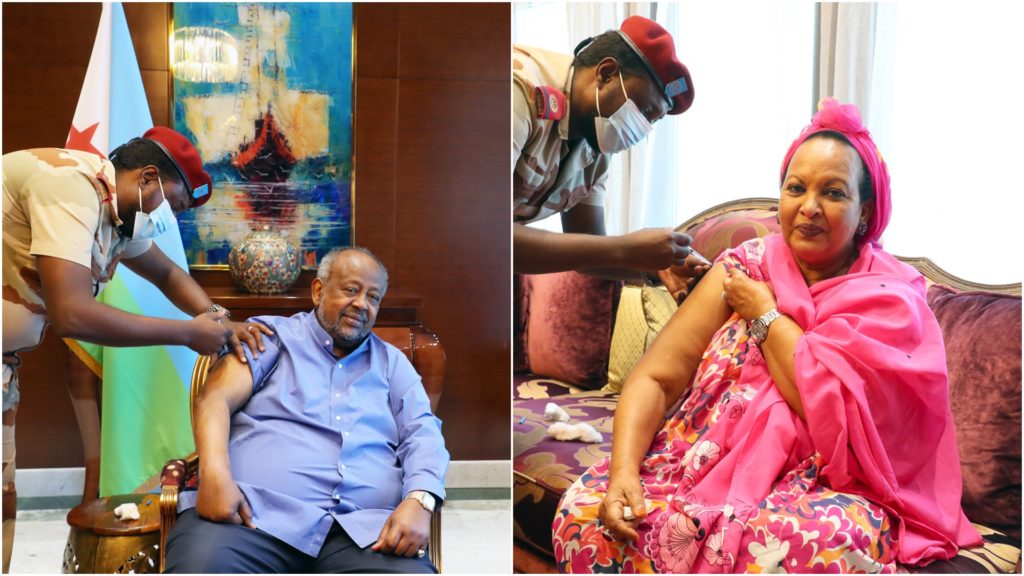
EXPLAINED: How Guelleh's dictatorship survived in Djibouti

The incumbent Ismail Omar Guelleh, often referred by his initials IOG, is announced as the winner. He will probably serve his fifth term as president of Djibouti. Guelleh was in office since 1999, when he was first elected as president after he was handpicked by his uncle, Hassan Gouled Aptidon, who had ruled Djibouti since independence.
Djibouti is home to the greatest number of foreign military bases in Africa – the U.S., France, Britain, Japan, and recently Saudi Arabia and China. The country has a population of only about 900,000 people.
In the latest Friday’s election, the only known opposition: the independent candidate and businessman Zakaria Ismail Farah halted campaigning asserting that he could not do so in safety. In protest, he appeared with his mouth taped shut. However, the Interior Minister Moumin Ahmed Cheick told public broadcaster RTD that Guelleh obtained 167,535 votes, which is 98.58 percent of the vote.
According to independent analysts in Djibouti, it is not by surprise that Guelleh would obtain more than 98 per cent of votes even after his biggest challenger boycotted.
Restrictions on free assembly and association; abusing and detaining journalists and government critics; abridgement of the ability of citizens to choose or influence significantly their government and a rampant corruption is what makes president Guelleh to successfully run Djibouti.
Here are five facts that made Guelleh’s dictatorship survive in Djibouti:
1. Removal of term limits
In April 2010, Djiboutian Lawmakers removed the term limit by approving an amendment to the constitution that paves the way for president Guelleh to run for a third term during the 2011 general elections. Djibouti’s parliament which acted under the suggestions of Guelleh voted unanimously for what they termed as "constitutional reforms” which also cut the presidential mandate to five years from six. This was the beginning of Mr. Guelleh attempt to hold power and not leave after his term ends.
2. Human rights violations
Violations of human rights in Djibouti are an alarming concern within its borders and abroad. In various reports by international governmental and independent organizations, security forces under president Guelleh continue to arrest, torture and kill civilians. One notable incident is the killing of more than 30 persons gathering for a religious ceremony in October 2015.
The most visible instances of these violations are made apparent through Djibouti’s corrupt government, the absence of freedom of the press, and crimes against women.
Many of the problems with human rights in Djibouti are rooted in its corrupt government. Given that the government is fully controlled by a single party (the Union for the Presidential Majority UPM), the rights of citizens are nearly nonexistent due to the lack of political diversity. Citizens who openly disagree with legislation passed by the party are harassed, arrested or even tortured.
3. No independent media while journalists and critics are targeted
No independent media exists in Djibouti. In order for the government-owned party UMP, which is under Guelleh, to promote governmental propaganda and to prevent formations of other political parties, the party has enacted several methods to keep opposing forces down such as abducting journalists, threatening news reporters from other countries and silencing human rights activists for promoting ideas which did not align with governmental ideals.
Without the presence of the media to share their plight, the most vulnerable citizens of Djibouti are left without a voice. The U.S Embassy in Djibouti reported in 2018 that security forces arrested and abused journalists, demonstrators, and opposition members.
In April 2020, Djibouti authorities detained Fouad Youssouf Ali, a former lieutenant in Djibouti’s air force, who fled to neighboring Ethiopia in late March 2020, apparently to seek asylum. Fouad was charged him with treason without a lawyer, as documented by Human Rights Watch.
4. Corruption
Corruption, particularly by president Guelleh and his closest family members has become rampant without any sort of accountability.
Stationed in one of the most ideal seaports in Africa, Djibouti’s economy should be sufficient in providing for the needs of the country. According to President Guelleh, the government receives $40 million in profits from its port. What is shocking about this statement is that this funding does not appear in the official records for Djibouti’s national budget.
Corruption in Djibouti’s government is a well-known issue internationally, yet no high-level civil servants have received punishment for their crimes.
In October 2015, a well-known Djiboutian businessman Abdirahman Boreh exposed there was widespread corruption within the government and the presidency of Djibouti, using this argument as his defence against the claims of bribery and corruption levelled at him during a hearing at a court in London, United Kingdom. President Guelleh who was mentioned as key witness in the case has refused to appear as a witness to the court.
A report by U.S Embassy attributed that corruption in Djibouti was a problem in all services, particularly in the lower ranks where wages were low. There were reports of judicial corruption and lack of independence for judicial officials.
5. Lack of accountability
Even the revelation of $40 million profit from port deals has not made citizens and international aid donors to question how Djibouti is utilizing its funds while the majority of people in Djibouti are still living in poverty.
Foreign governments including the African Union and the United Nations have not sought any kind of accountability for the actions of Guelleh’s regime and even to the worse some have invested the corrupt regime with billions of monies. In March 2010, Guelleh said that China would be Djibouti’s biggest investor and that he planned to make Djibouti port the biggest hub in the region at a cost of nearly half a billon U.S. dollar.
It is estimated that Guelleh autocratic system makes $300 million annually from the foreign military bases including the United States Naval Expeditionary Base Camp Lemonnier. China alone pays $20 million annually as a lease for its base in Djibouti.
Mr. Guelleh’s family and its close allies dominate both politics and the country’s economy through cabinet positions and business conglomerates controlled mainly by Issa. In particular, the wife of the president, Kadra Mahamoud Haid, maintains a key position in the economy and exercises significant influence as an adviser to her husband, which reportedly also includes appointments to government positions. Almost all payments from foreign deals are enriching president Guelleh and his family and therefore accountability is impossible.
Source: Hornfacts.com
Leave a comment
- Popular
- Rated
- Commented
04/11/2021 - 11:05:02
28/05/2024 - 15:44:10
02/12/2021 - 11:34:53
01/03/2021 - 09:00:37
Opinions
18/05/2025 - 16:26:37
15/05/2025 - 20:16:04
Politics
17/04/2025 - 01:58:17
13/04/2025 - 10:59:05
Terror Watch
30/05/2025 - 00:04:19
18/05/2025 - 00:37:46
 0
0 




































EXPLAINED: How Guelleh's dictatorship survived in Djibouti
MOGADISHU, Somalia — The people of Djibouti went to the polling stations on Friday to vote for the country's president. This was the country's eighth poll since its independence in 1977. The last election took place in 2016, which was